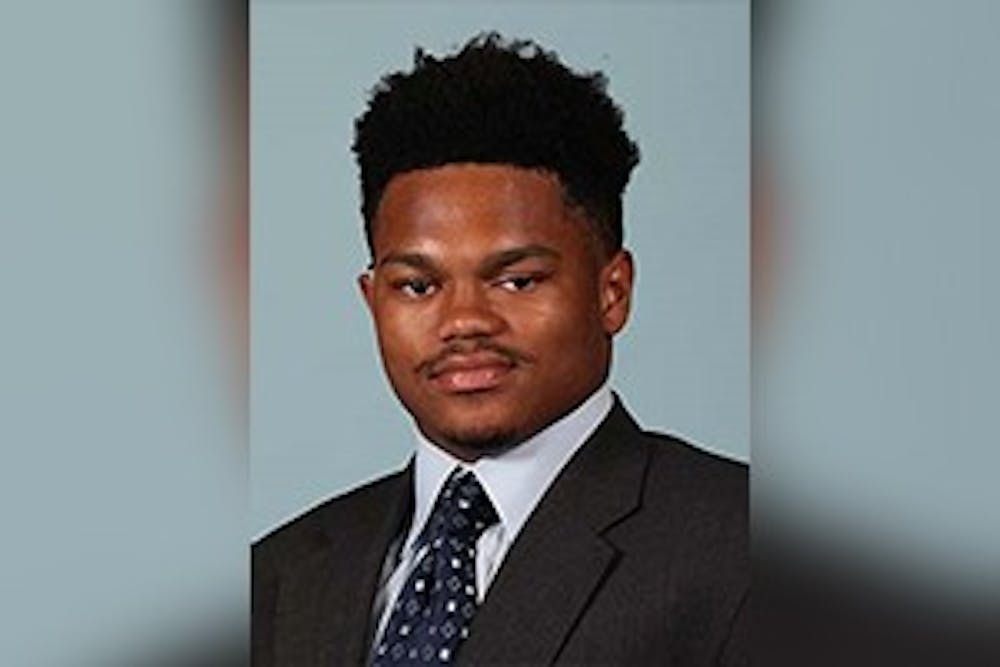Football is, above all, a game of awareness. Players need to read the field ahead of them, make quick decisions, and communicate with their coaches and teammates to form a well-oiled machine and move the ball down the gridiron.
Imagine for a moment, though, that your primary method of communication was eliminated. For Penn running back Aaron Jones, a freshman from Bethesda, Md., this is a reality. Jones, who is the son of former Penn cornerback Abraham Jones, was born completely deaf.
“Playing deaf, there were some challenges, but not so much for Aaron,” the elder Jones said to WDVM. “I’ve found that the bigger challenges were with the adults, the coaches. Most coaches had never coached a deaf kid.”
The difficulties borne out of this communication gap manifested as Jones struggled to get on the field early in his career.
“My first two years I was struggling getting opportunities, coaches weren’t giving me opportunities,” Aaron Jones said to WDVM.
Not seeing game action despite success on the practice field can frustrate some players and cause them to lose focus on their long-term goals. For Jones, though, his goals never changed, and his commitment to being the best football player he could be remained as solid as ever.
This persistence and patience paid off when Jones finally got his chance to shine on the field. His biggest season was his junior year in 2019. Jones ripped off over 1,200 yards and 16 touchdowns in what was his last full-length high school season.
While some may have been surprised by Jones’ breakout, the running back knew that he was simply doing his job.
RELATED
Penn Athletics Fall preview: Soccer, field hockey, football season expectations
From Penn football to Nike Master Trainer: tracing Joe Holder's fitness industry ascent
“I started balling and playing,” Jones said to WDVM. “Doing what I [have to] do to help the team win.”
A big part of Jones’ growth as a player was a specialized helmet that allowed him to play football with the cochlear implant that he has had since he was two years old. Prior to his use of this helmet, Jones would simply play without the implant, with a complete lack of his sense of hearing. The addition of the cochlear implant to his game, however, made Jones immediately feel more comfortable on the field.
“It sends sounds to my brain, allowing me to hear better,” Jones said to the Pitch.
Jones’s breakout season coincided with his transfer to Walter Johnson High School in Bethesda, after spending his first two years of high school at Woodrow Wilson High School in Washington, D.C. He was named a captain in his first season at Walter Johnson and retained the leadership role in his abbreviated senior season.
Despite the challenges he faced, Jones excelled in all aspects of his high school athletics experience. In addition to his success on the football field, he played basketball and ran track in high school, becoming a four and three-time letterwinner, respectively. His track team won a Maryland state championship in 2019, and he was named Scholar Athlete of the Year.
Reflecting on his success in an interview with WDVM, Jones acknowledged how rewarding it was to have achieved the potential he knew he always had inside of him.
“It feels good,” Jones said to WDVM. “I feel like everything that I’ve been working up to has been accomplished.”
As he moves into the college game, Jones knows that his greatest challenge on the football field is yet to come. The freshman running back understands, however, that all he needs to do is work hard and do what he can to contribute to the team. As he looks ahead to his future at Penn and beyond, Jones is ready to work as hard as he needs to in order to make an impact and find success.









